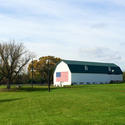The following excerpt is from The American Heartland’s Position In the Innovation Economy, a newly released report written by Ross DeVol, Jonas Crews, and Shelly Wisecarver. Their report highlights the strengths and weaknesses of the American Heartland's position in the 21st century economy. read more »
Heartland
The American Heartland’s Position In the Innovation Economy
- Login to post comments
Perspectives on Defining the American Heartland
The following excerpt is from a new report, Perspectives on Defining the American Heartland, written by Ross DeVol, a Walton Family Foundation Fellow. Read the full report (PDF) here. read more »
- Login to post comments
What the Census Numbers Tell Us
The most recent Census population estimates revealed something that the mainstream media would prefer to ignore—the slowing population growth of big cities, including New York. The New York Times, for example, trumpeted Gotham’s historically high population yet failed to mention that the city’s growth is not only dramatically slowing but also, in the case of Brooklyn, declining for the first time since 2006. read more »
- Login to post comments
Amazon’s HQ2 Is a Golden Opportunity for the Heartland
The Wall Street Journal is reporting that Amazon is seeking bids for a second headquarters location that will be equal in size to its current Seattle base. (You can read their RFP here). It would ultimately employ 50,000 people in eight million square feet of office space at an average salary of over $100,000. read more »
- Login to post comments
Postcards From the Zombie Apocalypse
I’m regularly accused of being a doomer whenever I point out the obvious – that many aspects of how we’ve organized our affairs over the last several decades aren’t meant to last. So they won’t. The end of Jiffy Lube and Lean Cuisine isn’t The End. Civilization will carry on without them, I assure you. But when it’s suggested that our current set of arrangements won’t last forever people immediately imagine Mad Max, as if no other alternative exists. Things are going to change. They always have and they always will. read more »
Red State Conundrum
How do you raise incomes when your state’s economic appeal is based on low costs?
That’s the basic conundrum facing a number of red states. They rightly talk about their cost climate, touting tax rates and such. But the biggest component of cost for many businesses is labor. Being a low cost state is tantamount to being a low wage one in many cases. read more »
- Login to post comments
The Superstar Gap
The biggest challenge facing many cities in transitioning to the knowledge economy is a shortage of “A” talent, especially true superstars.
All “talent” isn’t created equal. Crude measures such as the percentage of a region with college degrees, or even graduate degrees, don’t fully capture this. It is disproporationately the top performers, the “A” players and superstars that make things happen. read more »
Where Manufacturing Is Thriving In The U.S.
Throughout the dismal presidential campaign, the plight of America’s manufacturing sector played a central role. Yet despite all the concerns raised about factory jobs leaving the country, all but 18 of the country’s 70 largest metropolitan regions have seen an uptick in industrial employment since 2011. read more »
The Great Betrayal of Middle America
America’s vast midsection, a region that has been hammered by globalists of both parties, has been abandoned by the great corporations that grew fat on its labor and resources.
To many from the Appalachians to the Rockies, Donald Trump projected a beacon of hope. Despite the conventional wisdom among the well-heeled of the great coastal cities, these resource and manufacturing hubs elected the new president. read more »
America's Heartland is Critical to Our Future
The results of the 2016 presidential election have been ascribed -- by the winner’s critics -- to racism, hysteria, stupidity, or nostalgia. But what the results most reflected was a looming economic divide. Essentially, Donald Trump won in the parts of the country that grow most of the food, drill for oil and gas, and produce palpable things. The places that went for Hillary Clinton are where intangibles such as media, software, and financial transactions drive the economy. read more »
- Login to post comments






















